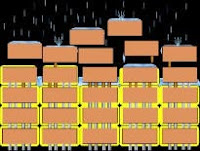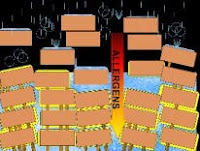I've stumbled upon one groundbreaking International report on what causes eczema. It's so groundbreaking, that it supersedes conventional medical opinions on eczema causes.
The report, published in the Journal of Allergy and Clinical Immunology, states that until now, people believe that most eczema sufferers were having an immune reaction to some external influence.
However, the new evidence resulting from global studies suggest that in mild to moderate form, the skin disease is probably triggered by something other than an allergic reaction to allergens.
Here's the groundbreaking notion - a key factor in developing eczema is the structure of the skin barrier and the integrity of the cells' lipids and binders.
The report stated that people prone to eczema have a much thinner skin barrier than people with normal skin and this can be seen under a microscope, even if they do not have obvious eczema lesions.
To illustrate, please consider these explanations:
 1: Normal skin
1: Normal skin
The very top layers of skin are cast off to let new skin come through.
Skin cells (bricks) are held together by binders (iron rods) and lipids (mortar).
 2: Skin prone to eczema
2: Skin prone to eczema
Faulty genes break down the skin barrier's binders or iron rods much faster than normal.
People with eczema also have gaps in their lipids or mortar.
This results in cracks all the way through the skin barrier.
 3: Soap and detergents
3: Soap and detergents
Irritants such as soap cause more break down and the "brick wall" starts to fall apart.
 4: Dust mites and bacteria
4: Dust mites and bacteria
A broken barrier lets allergens enter the skin easily.
Germs and more irritants then lead to an eczema flare.
How to protect your weaker, eczema prone, skin barrier
The report also confirm the importance of treating eczema much earlier in the cycle rather than waiting for a flare to occur.
The Eczema Control Plan, endorsed by the Eczema Association of Australasia Inc. (EAA), identifies and promotes understanding of the three stages of eczema - clear skin, first itch and redness and full flare.
President of the EAA and long-term eczema sufferer, Ms Cheryl Talent said, that if followed correctly, this plan empowers people to control their eczema and reduce their eczema flares by half.
The Eczema Control Plan allows patients to follow a simple, three step treatment regimen as prescribed by their doctor and includes:
# step 1 - use of a daily moisturiser when skin is clear
# step 2 - use of non-steroidal creams to control eczema at the first signs of symptoms and just after a major flare
# step 3 - use of steroid creams or ointments during a severe eczema flare.
To me, it's plain simple to follow and would like to suggest you to write it on a piece of paper, and stick it to the place you often visit - on your work desk, on the fridge, etc. I'd suggest my wife to try this, too.
Tiny cracks in skin barrier key to developing eczema full article
Ivan Widjaya
Skin barrier protector











.gif)
1 comments:
Thank you for the tips. Kiss!
Post a Comment